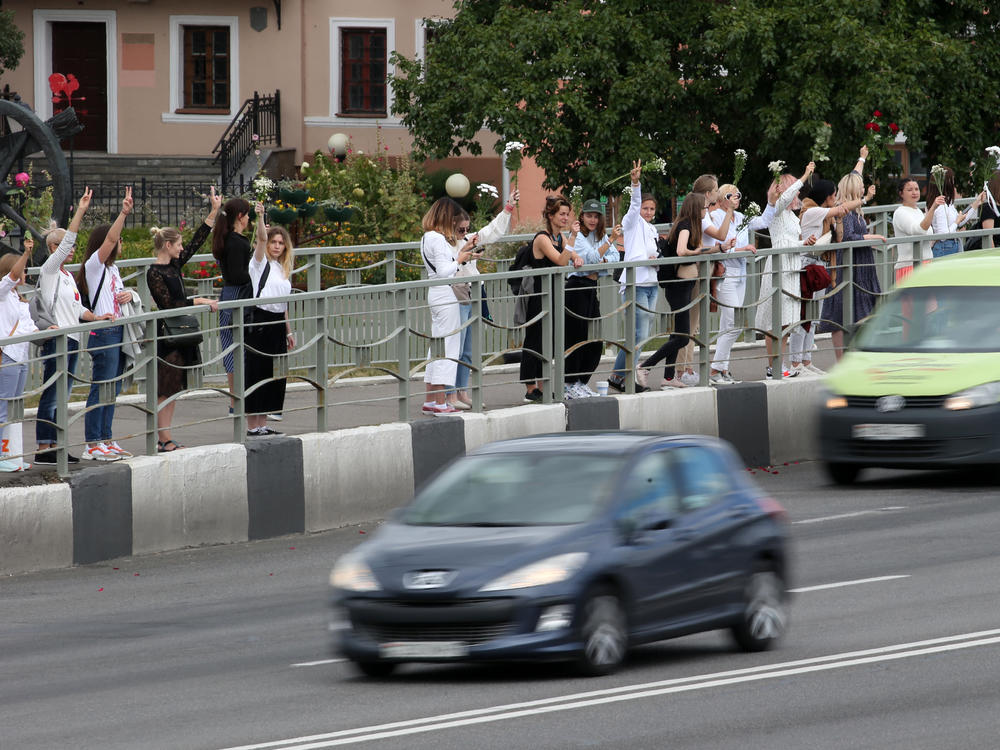Section Branding
Header Content
Women In Belarus Take To The Streets To Protest Post-Election Crackdown
Primary Content
On Thursday, thousands of women, many dressed in white and carrying flowers, turned out in the streets across Belarus for a second day of protests. They're reacting to a violent crackdown on anti-government demonstrations triggered by a weekend election widely viewed as fraudulent.
Security forces have repeatedly clashed with protesters in recent nights, using batons, stun grenades, tear gas and rubber bullets. Belarusian authorities said they have arrested some 7,000 people.
The protests broke out after President Alexander Lukashenko declared a landslide in Sunday's election, laying claim to a sixth term in office. His main opponent, Svetlana Tikhanovskaya, initially protested the results of the election, then disappeared — and resurfaced in neighboring Lithuania, to join her children, who were sent out of Belarus for their safety during the campaign. Tikhanovskaya posted a video in which she said she had been forced to make the difficult decision to leave the country.
Tikhanovskaya, a 37-year-old political novice, stepped into the race against Lukashenko after election authorities refused to register the candidacy of her husband, activist blogger Sergei Tikhanovsky, who gained popularity with a YouTube channel critical of the government. He was arrested and jailed two days after announcing his intentions to run for office and remains in jail.
In the capital of Minsk on Thursday, women, some carrying portraits of loved ones detained in the crackdown, formed a "line of solidarity," silently joining hands to protest the election and the unrest that has followed.
Valentina Chailytko, 49, whose husband and son were detained in protests Sunday, has been unable to learn their whereabouts. "I argued with my husband and voted for Lukashenko," she told The Associated Press. "And this is what I got in the end — I can't find my relatives in prisons."
Minsk resident Yelena told Reuters on Wednesday that she couldn't leave her children at night, "but I can come during the daytime and say my piece."
In a video posted by Radio Free Europe/Radio Liberty, one unidentified woman said the protesters were calling on authorities "to stop the violence and the bloodshed [and] to stop beating innocent people."
"We want to show that we have come out with just our bare hands, unarmed just like the rest of the protesters," she said, adding that the security forces were "armed and being violent."
The video was posted Thursday but apparently was made during Wednesday's demonstrations.
Lukashenko, who assumed office in 1994, has been dubbed "Europe's last dictator" for his strongman rule and tenacious hold on power.
Secretary of State Mike Pompeo has condemned the conduct of Sunday's election, and the European Union is considering sanctions against Lukashenko's government.
In a statement Thursday, the EU's foreign policy chief, Josep Borrell, called for "a substantial political change" in Belarus and described the situation there as "a matter of grave concern."
"After last Sunday's Presidential elections, Alexander Lukashenko and the [Belarusian] authorities must stop the repression against the Belarus people and open negotiations with the wider society," he said.
In an interview Wednesday, Pompeo told Radio Free Europe/Radio Liberty that Washington wants "good outcomes for the Belarusian people, and we'll take actions consistent with that."
"[W]e've watched the violence and the aftermath, peaceful protesters being treated in ways that are inconsistent with how they should be treated," he said, speaking from Prague.
Moscow, whose energy subsidies have helped prop up Lukashenko, on Thursday blamed outside forces for trying to destabilize Belarus.
"We note unprecedented pressure that is being exerted by individual foreign partners on the Belarusian authorities," Russian Foreign Ministry spokeswoman Maria Zakharova said.
"We can see clear attempts of outside meddling in the internal affairs of a sovereign state to create a rift in society and destabilize the situation," she told reporters at a briefing.
Copyright 2020 NPR. To see more, visit https://www.npr.org.

